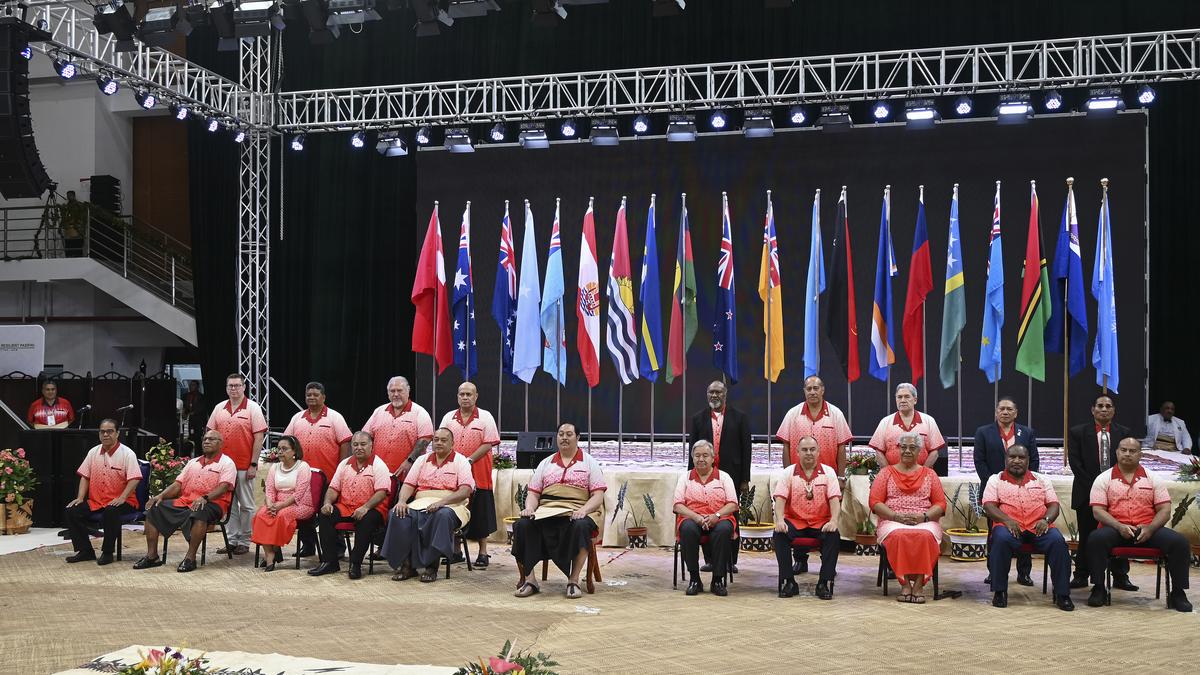The Pacific Islands Forum (PIF) concluded its annual summit in Tonga, marked by significant developments regarding regional security, Taiwan’s role in the Pacific, and climate action. While the event saw regional leaders reaffirm their commitment to collective action on pressing issues, tensions simmered beneath the surface, highlighting the delicate balancing act countries in the region face between their competing interests.
Strengthening Regional Security
A key outcome of the summit was the endorsement of a joint policing initiative spearheaded by Australia. The plan, designed to enhance police capacity in the Pacific, proposes the establishment of four regional police training centers and a multinational crisis response force. Australia pledged $271 million in initial funding, fueling optimism among many member states.
A “Godsend” or a Tool for Control?
While nations like Fiji hailed the initiative as a “godsend,” others, particularly those with close ties to China, expressed reservations. Solomon Islands, a close ally of China, voiced concerns about the plan imposing conditions on its domestic security.
This sentiment reflects underlying anxieties about the initiative’s broader geopolitical implications. Critics perceive the policing plan as a strategic move by Australia to curtail China’s influence in the region, potentially undermining the autonomy of Pacific island nations in their security arrangements. The “halfsies” joke shared by Australian Prime Minister Anthony Albanese and a U.S. diplomat further fuelled these suspicions, suggesting a concerted effort to maintain a dominant presence in the Pacific.
The Declaration’s Ambiguity
The final declaration of the forum, while endorsing the policing plan, acknowledged that some member states may require additional “national consultation” before implementing the initiative. This suggests that the consensus surrounding the policing scheme is not absolute, and certain countries remain hesitant about its implications.
Taiwan’s Continued Presence
Another pivotal issue was the ongoing attempt by Solomon Islands to effectively sideline Taiwan from the PIF, a move championed by China. Solomon Islands’ Foreign Minister Peter Agovaka argued that the forum should only include “sovereign states,” suggesting that Taiwan’s participation, as a state governed by another jurisdiction (in this case, China), was illegitimate. However, the summit’s final declaration reaffirmed the 1992 agreement that has allowed Taiwan to participate in the forum for three decades. This move was met with disbelief from China’s special envoy to the Pacific Islands, who claimed that the text of the declaration did not reflect the “consensus” of members and should be corrected.
A Shifting Landscape
This attempt to marginalize Taiwan highlights the ongoing tug-of-war between China and Taiwan for influence in the Pacific. While China has successfully persuaded Solomon Islands, Kiribati, and Nauru to switch their recognition to Beijing, Palau, Marshall Islands, and Tuvalu continue to maintain diplomatic relations with Taipei, facing persistent pressure to switch. The PIF’s stance, despite China’s dissatisfaction, reinforces the bloc’s commitment to recognizing Taiwan’s engagement, a key source of development assistance in the region.
Climate Action and Deep Sea Mining
While regional security and Taiwan’s participation in the forum took center stage, climate change and deep-sea mining remained major talking points.
A Global Plea for Climate Action
UN Secretary-General Antonio Guterres addressed the summit, emphasizing the need for renewed efforts to secure climate finance. A recent report highlighting the vulnerability of Pacific coral atolls and low-lying islands to rising seas reinforced the urgency of action.
This urgency led the Pacific leaders to commit to organizing a global pledging event this year to secure funds for a new climate fund. This fund, to be headquartered in Tonga, currently falls short of its $500 million goal. The Pacific’s strong stance on climate finance reflects their experience as front-line victims of climate change and their commitment to ensuring adequate resources for climate mitigation and adaptation.
Deep-sea Mining Debate
Despite its absence from the official agenda, the controversial issue of deep-sea mining sparked considerable debate. Nauru, a Pacific microstate, is leading the push for large-scale ocean mining operations as early as 2026. However, other nations like Palau advocate for a moratorium, citing the need to address concerns about potential environmental damage.
The PIF’s commitment to holding a “talanoa” (dialogue) on deep-sea mining this year reflects the complex and divided opinions on this issue. While the potential economic benefits are alluring, particularly for nations with limited resources, the ecological risks remain a significant concern for many. This dialogue presents a critical opportunity for the PIF to collaboratively weigh the potential gains against the ecological and environmental concerns.
A Divided Region
The PIF summit in Tonga reflected the multifaceted challenges faced by the Pacific Islands, balancing national interests with regional cooperation. While a common goal exists to address shared issues like climate change, other areas, such as security and regional politics, are rife with conflicting views. The delicate balance of power in the region, influenced by the competing interests of China, Australia, and the United States, will continue to shape future developments.
Key Takeaways:
- The Pacific Islands Forum is wrestling with competing interests, highlighting the complexity of regional dynamics.
- Security concerns are central, with Australia’s initiative attracting both support and apprehension.
- Taiwan’s participation in the PIF is reinforced, despite China’s efforts to sideline it.
- Climate action is a high priority, with Pacific leaders advocating for increased climate finance.
- Deep-sea mining raises significant concerns, with the PIF committed to a formal dialogue on the issue.




